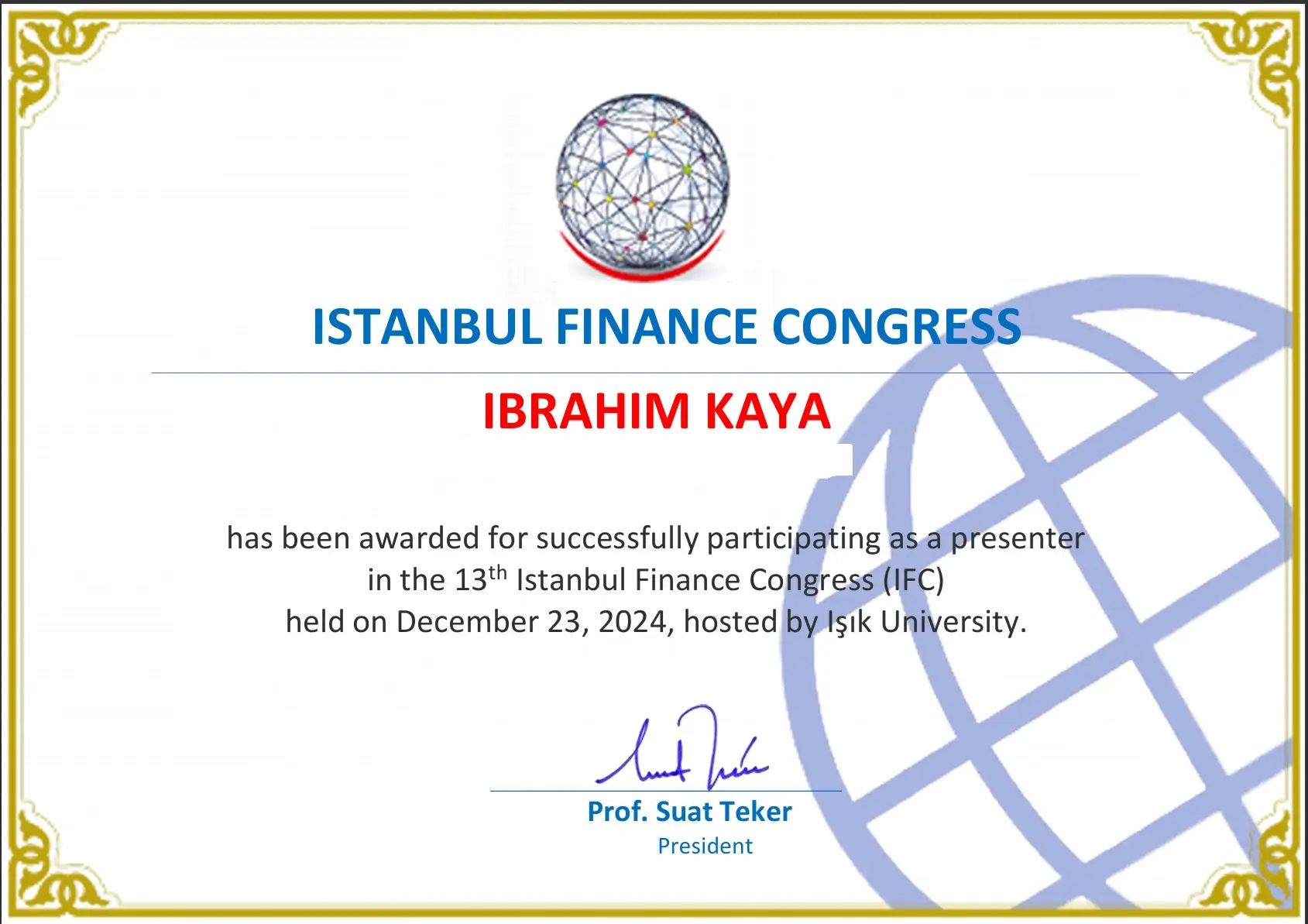My Articles
Assessing the Influence of Türkiye's Floating Exchange Rate Policy on Mutual and Pension Fund Performance
In this piece, I explore the impact of Türkiye’s floating exchange rate policy on the performance of mutual and pension funds, particularly focusing on the effects of USD/TL fluctuations. Over the past decade, these exchange rate movements have significantly influenced fund sizes and returns, forcing fund managers to adopt various strategies such as hedging and strategic asset allocation.
This analysis also highlights how major events like the 2020 COVID-19 pandemic and the 2023 earthquake intensified currency fluctuations, presenting additional challenges for fund managers. The depreciation of the Turkish Lira has been a recurring issue, negatively affecting both mutual and pension fund performance. While fund managers have implemented risk mitigation techniques to counterbalance the Lira’s volatility, ongoing currency instability continues to demand adaptive strategies to sustain fund performance amidst uncertain economic conditions.
Through this study, I aim to provide deeper insights into how exchange rate movements, inflation, and portfolio sizes are interconnected, and how the ever-evolving financial landscape in Türkiye affects fund management.
From Headlines to Trendlines: Leveraging Sentiment Analysis for Market Predictions
In today’s fast-paced financial markets, the ability to quickly interpret news and make informed decisions is crucial for traders and analysts. This article explores how sentiment analysis can be used to predict market movements by analyzing the tone of financial news headlines. By applying advanced Natural Language Processing (NLP) techniques, particularly the VADER sentiment analysis tool, this research aims to understand how news sentiment impacts stock market trends.
Using Python-based web scraping tools, financial headlines were collected from trusted sources over a 30-day period. The data was then cleaned and preprocessed to ensure high quality before applying sentiment analysis algorithms to generate sentiment scores. These scores were subsequently analyzed for their correlation with market movements, helping to identify potential trends and trading opportunities.
The results indicate that sentiment analysis provides valuable insights into market behavior, showcasing how qualitative news data can be integrated into algorithmic trading strategies. Additionally, this research emphasizes the importance of real-time data processing in financial trading and addresses some of the challenges, such as data accuracy and processing speed, that traders face when using big data technologies. As machine learning and big data continue to reshape the financial sector, sentiment analysis of news headlines stands out as a promising tool for improving market predictions and trading efficiency.
Understanding the Basics of Modern Portfolio Theory with PyPortfolioOpt

This article offers a practical introduction to applying Modern Portfolio Theory (MPT) using Python for portfolio optimization. MPT, developed by Harry Markowitz, provides a framework for constructing portfolios that aim to maximize returns while minimizing risk through diversification. Python’s rich ecosystem of tools makes it an excellent choice for efficient portfolio management, offering solutions for optimization, risk management, and performance evaluation.
Using the PyPortfolioOpt library, this guide walks through the key steps in portfolio construction, from data preprocessing to optimization and performance evaluation. The goal is to build a portfolio that maximizes returns relative to risk, following MPT principles. This method provides investors with a structured approach to achieving better risk-adjusted returns in their investments.
Data Envelopment Analysis: Optimization and Sustainability in Production
Data Envelopment Analysis (DEA) is a powerful tool used to measure the relative efficiency of various units or processes. This study explores how DEA can be applied to optimize production and ensure sustainability. By measuring performance, DEA helps identify ways to optimize production, aiming for faster, higher-quality outputs while minimizing the consumption of raw materials, energy, and natural resources.
Managing energy consumption—both planned and actual—relies heavily on big data analysis. Tracking electricity costs, unit costs, and inefficiencies is crucial. With real-time monitoring and predictive models, businesses can achieve optimal production by aligning energy use with operational needs. This approach is relevant across various industries such as cement, chemicals, automotive, food production, and defense.
Performance measurement involves comparing set targets with actual outcomes, using input-output ratios and efficiency frontier methods. By planning energy consumption and monitoring it through hourly and daily data, companies can optimize production processes in line with energy price forecasts. Each variable in the database is reported to upper management through automated email alerts or notifications, ensuring proactive decision-making.
Cloud-based data architecture offers solutions for data compression, backup, and storage. The collected data is analyzed and visualized on platforms like Colab-Python, while performance metrics are shared with unit managers through warning signals. The goal is to achieve maximum production with minimal use of raw materials, natural resources, and energy.
Shaping the Future of Mutual Funds in Türkiye: A Middle Eastern Perspective
The size and influence of Middle Eastern capital, fueled by vast oil revenues, play a critical role in the global investment landscape. High-net-worth individuals from conflict-affected countries such as Afghanistan, Syria, Lebanon, and Palestine often seek stability by investing in international markets. Traditionally, these investors have favored the established financial hubs of the UK and Switzerland due to their perceived stability and expertise.
However, Türkiye offers a unique opportunity for attracting this capital. With efficient management, Turkish mutual funds could become a preferred destination for Middle Eastern investors who have historically chosen Europe. The potential shift in investment preferences towards Türkiye would not only boost its financial markets but also channel significant capital flows away from Europe.
This article explores how Türkiye, by leveraging its geographical and cultural ties to the Middle East, and through strategic fund management, can position itself as a key player in the global investment market. By focusing on effective governance and aligning with regional investor needs, Türkiye’s mutual funds could capture a larger share of Middle Eastern wealth, reshaping the future of its financial markets.
Shaping the Future of Islamic Funds in Türkiye: Tapping into Growth Potential in the Middle East
Islamic funds, which adhere to Sharia-compliant investment principles, hold significant potential for attracting capital from the growing Muslim population, particularly in the Middle East. As high-net-worth individuals from conflict-affected regions like Afghanistan, Syria, Lebanon, and Palestine seek stable investment opportunities, Türkiye is well-positioned to become a preferred destination for Islamic fund investments. Traditionally, many Middle Eastern investors have chosen financial hubs like the UK and Switzerland, but Türkiye offers unique advantages due to its cultural and geographical proximity to the region.
By focusing on efficient management and enhancing the transparency and governance of its Islamic funds, Türkiye can tap into this rising demand. Islamic funds are especially appealing to Muslim investors due to their ethical and religious alignment, and their volume could experience significant growth if effectively marketed and managed.
This article highlights how Türkiye can capitalize on its strategic position by aligning its investment offerings with the values and needs of Muslim investors. The growing preference for Islamic finance presents a tremendous opportunity for Türkiye to capture a larger share of Middle Eastern wealth, positioning its financial markets as a major hub for Islamic funds. By doing so, Türkiye’s mutual funds sector can experience substantial growth, transforming the future of its financial markets while fostering deeper connections with investors across the Muslim world.
The Role of Ethical Investing in Reducing Income Inequality
Ethical investments play a crucial role in shaping a sustainable economy. These types of investments include socially responsible funds, environmental and social impact funds, sustainable investments, and religious-based funds, such as Islamic funds. Among these, Islamic funds stand out, particularly in addressing social inequalities, especially in developing countries like Türkiye.
There is growing evidence that Islamic funds not only support the development of a sustainable economy but also contribute to social welfare. In fact, research suggests a connection between the efficiency of Islamic funds in Türkiye and income inequality. As the performance of these funds improves, measured by their efficiency scores, income inequality, reflected in Türkiye’s Gini coefficient, tends to decrease. However, while this correlation exists, it is not strong enough to fully explain the reduction in income inequality on its own.
The broader goal of ethical investing is to ensure that resources are used efficiently to create a more equitable society, aligning with global objectives such as the United Nations’ goal of reducing inequality. By making conscious investment choices in areas like sustainability, social responsibility, and religious-based funds, ethical investing can help shape a future where economic progress is balanced with social equity.
Ethical investments, whether through sustainable projects, socially responsible ventures, or impact-driven funds, collectively contribute to building a better and more just world for future generations.
